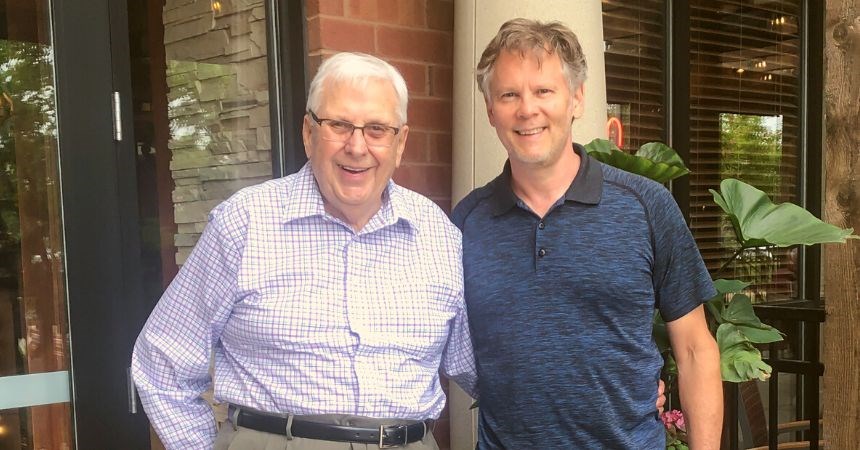Twenty-three years after his retirement, Larry Knutson continues to impact the children at the Ranch—not only through the strong organization he left behind, but through his donations and his relentless sharing of the Ranch's mission.
Over the last couple years, Larry has been recognizing people who walked beside him during his time at the Ranch—sharing their knowledge and helping him be successful—by purchasing acorns and leaves on the Ranch's Tree of Life in their honor.
"I was purchasing Memorial acorns when it occurred to me that they are for the family and friends, not the departed. Why not honor the people while are still here? You've got some people at the Ranch who have contributed so much, and many who have been there over 30 years. I wanted them to know they are appreciated."
Why does he continue to support the Ranch?
"Because the Ranch was my life," he said.
As a fundraiser for Dakota Boys and Girls Ranch, Larry Knutson was decades ahead of his time. In his 32 years at the Ranch, Larry not only led the ministry operations during a period of great growth, but built a sophisticated fundraising department and a network of Ranch donors across the United States.
After a sting in the Navy, Larry attended the University of Minnesota while his future wife, Mickey, completed her nursing degree. They got married the summer after she graduated and moved to Grand Forks, where he finished his Social Work degree at the University of North Dakota. He worked at Catholic Family Services in foster care and adoption and completed his master's degree in Social Work in Seattle, WA. In 1966, he moved to Minot where he was hired as a Social Worker at the Ranch—the same year he and Mickey adopted their son, Jim.
Just three months later, the Executive Director left, and Larry was named Director of the entire organization.
"I was a social worker. I didn't know anything about running an organization or raising money. It was all new to me," Larry said.
By necessity, he was a quick learner. The Ranch had sold bonds to underwrite operating costs, and they were coming due.
"We didn't have any money to pay them off so that got me into a little bit of fundraising," Larry said. "I started writing letters asking people for money. When I asked the bondholders if we could pay just the interest until we raised the money to pay them off, over half told us to tear them up."
Larry found out he was pretty good at writing fundraising letters, so he started writing to Lutherans throughout the U.S.
 He instinctively believed that personalizing the letters was important, so he hired typists. This was before word processing, so they worked year-round, typing letters one by one.
He instinctively believed that personalizing the letters was important, so he hired typists. This was before word processing, so they worked year-round, typing letters one by one.
At the same time, Larry started building connections through The Lutheran Church—Missouri Synod (LCMS). He attended LCMS conferences across the United States where he networked with pastors, congregation members, and women involved in the Lutheran Women's Missionary League. He developed personal friendships with Rupert Dunklau of the Dunklau Foundation, Dr. Oswald C.J. Hoffman of the Lutheran Hour, and other leaders in the LCMS. And he traveled the United States speaking at churches and visiting with people interested in supporting the Ranch ministry.
Much of Larry's success as a fundraiser was based in his willingness to take risks, his love of people and Christ, and his complete dedication to the Ranch's mission of helping at-risk children and their families succeed in the name of Christ.
As for running the organization's operations, Larry was instrumental in adding treatment and educational services.
"The boys were sent to the Ranch because they were 'delinquents,' but all of them had other issues and needed more than a place to live," Larry said. "Then I noticed that our kids were way behind in school. I got some of the Minot State University teachers to teach our kids during the summer, and we were able to raise them an entire grade level in Math and English."
During Larry's tenure as Director, the Ranch expanded to serve more boys, and the growing needs of the children coming to the Ranch, which led to the construction of many buildings on the Minot campus—including a chapel, gymnasium, greenhouses, dining center, an on-campus school, several cottages where the children lived, and a triplex of apartments for off-duty house parents. Larry used his extraordinary fundraising skills to build every one of these buildings without borrowing a dollar.
Larry also established the Dakota Boys and Girls Ranch Foundation to give donors the opportunity to provide financially for the needs of tomorrow—at a time when few organizations were creating foundations. In 1985, he moved from his position as Director of the Ranch to Director of the Foundation.
As the Director of the Foundation, Larry established the Honey Sunday Program, involving churches across the United States, and opened thrift stores to underwrite the services provided by the Ranch.
Larry continues to share the Ranch story with his friends and neighbors and invites them to become involved. 
"When you're involved in something, it's like a child," Larry said. "You see it grow and prosper after you leave, and you feel proud. I'm very pleased with where the Ranch is now. I want to see the Ranch grow and do even better. I give because I still want to help kids."
This article was originally published in Ranch Voice: Summer 2021.
Read more stories like this and explore other issues of Ranch Voice here.

